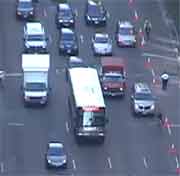
WEDNESDAY, Sept. 5 (HealthDay News) — Commercial drivers may understate their sleep apnea symptoms because they’re afraid they will lose their license, a new study says.
People with sleep apnea experience frequent disruptions to their breathing during sleep, leaving them with headaches, drowsiness and sometimes depression during the day. Sleep apnea is a well-established risk factor for traffic crashes, and commercial drivers could lose their license if their sleep apnea is believed to compromise their ability to perform their jobs safely.
In this study, researchers compared two groups of sleep apnea patients — 37 drivers of commercial vehicles, such as buses, taxis and trucks, with a control group of 74 people who didn’t drive for a living.
At the start of the study, all participants had a similar rate of sleep disturbances. But commercial drivers reported an average score of 8.1 on a sleepiness scale, compared with an average of 11 reported by those in the control group. The higher the number, the greater a person’s level of daytime sleepiness.
All participants were checked again after six months of treatment with continuous positive airway pressure (CPAP), a device that delivers a continuous stream of air to keep the upper airway open during sleep and prevent sleep apnea. The commercial drivers again reported fewer symptoms, obtaining an average sleepiness score of 4.8, compared with 7.7 for those in the control group.
The researchers also found that the commercial drivers received less treatment (only receiving CPAP for an average of 75 percent of days, compared with 83 percent for those in the control group), and also had more unscheduled visits to a sleep clinic. These findings suggest that the commercial drivers were struggling with their symptoms.
The lower levels of daytime sleepiness reported by commercial drivers indicate that they’re under-scoring these levels in order to keep their license, according to the authors of the study, scheduled for presentation Saturday at the European Respiratory Society’s annual meeting in Vienna.
“Our study suggests that commercial drivers are playing down their levels of sleepiness for fear of losing their jobs,” study lead author Dr. Werner Strobel, of University Hospital in Switzerland, said in a European Lung Foundation news release.
“Although this is very difficult to prove, both the group of drivers and the group of non-drivers began the study with a similar number of disturbances during the night,” he said. “You would therefore expect their reports of sleepiness to be similar to begin with, however the drivers estimated their levels of sleepiness as lower than the non-drivers. This pattern continued throughout the course of the study, with drivers reporting lower symptoms, yet receiving less treatment and making more unscheduled visits to the clinic.”
Strobel suggested the results be taken into account by health care professionals treating drivers with sleep apnea.
Because this study was presented at a medical meeting, the data and conclusions should be viewed as preliminary until published in a peer-reviewed journal.
More information
The American Academy of Family Physicians has more about sleep apnea.

